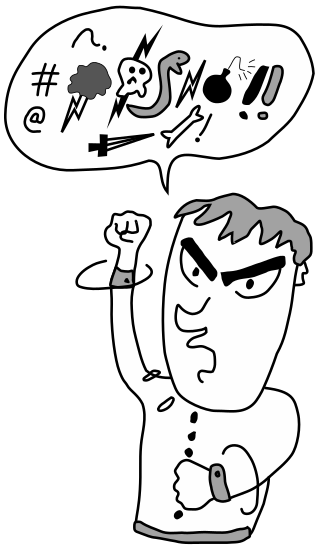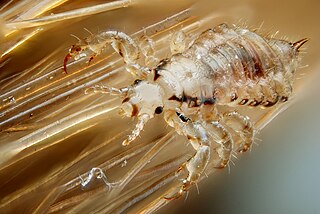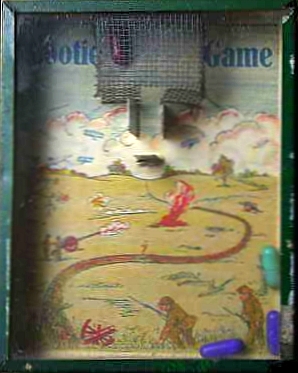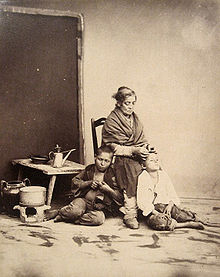Hubris, or less frequently hybris, describes a personality quality of extreme or excessive pride or dangerous overconfidence and complacency, often in combination with arrogance. The term arrogance comes from the Latin adrogare, meaning "to feel that one has a right to demand certain attitudes and behaviors from other people". To arrogate means "to claim or seize without justification... To make undue claims to having", or "to claim or seize without right... to ascribe or attribute without reason". The term pretension is also associated with the term hubris, but is not synonymous with it.
Nirvana is a concept in Indian religions, the extinguishing of the passions which is the ultimate state of soteriological release and the liberation from duḥkha ('suffering') and saṃsāra, the cycle of birth and rebirth.
A nerd is a person seen as overly intellectual, obsessive, introverted, or lacking social skills. Such a person may spend inordinate amounts of time on unpopular, little known, or non-mainstream activities, which are generally either highly technical, abstract, or relating to niche topics such as science fiction or fantasy, to the exclusion of more mainstream activities. Additionally, many so-called nerds are described as being shy, quirky, pedantic, and unattractive.

Profanity involves the use of notionally offensive words for a variety of purposes, including to demonstrate disrespect or negativity, to relieve pain, to express a strong emotion, as a grammatical intensifier or emphasis, or to express informality or conversational intimacy. In many formal or polite social situations, it is considered rude, and in some religious groups it is considered a sin. Profanity includes slurs, but there are many insults that do not use swear words.
Singular they, along with its inflected or derivative forms, them, their, theirs, and themselves, is a gender-neutral third-person pronoun. It typically occurs with an indeterminate antecedent, in sentences such as:

Yuppie, short for "young urban professional" or "young upwardly-mobile professional", is a term coined in the early 1980s for a young professional person working in a city. The term is first attested in 1980, when it was used as a fairly neutral demographic label, but by the mid-to-late 1980s, when a "yuppie backlash" developed due to concerns over issues such as gentrification, some writers began using the term pejoratively.

The head louse is an obligate ectoparasite of humans. Head lice are wingless insects that spend their entire lives on the human scalp and feed exclusively on human blood. Humans are the only known hosts of this specific parasite, while chimpanzees and bonobos host a closely related species, Pediculus schaeffi. Other species of lice infest most orders of mammals and all orders of birds.

Cooties is a fictitious childhood disease, commonly represented as childlore. It is used in the United States, Canada, Australia, New Zealand, and the Philippines as a rejection term and an infection tag game. It is similar to the British 'dreaded lurgi', and to terms used in the Nordic countries, in Italy, India and Iraq. A child is said to "catch" cooties through close contact with an "infected" person or from an opposite-sex child of a similar age.
This glossary of names for the British include nicknames and terms, including affectionate ones, neutral ones, and derogatory ones to describe British people, Irish People and more specifically English, Welsh, Scottish and Northern Irish people. Many of these terms may vary between offensive, derogatory, neutral and affectionate depending on a complex combination of tone, facial expression, context, usage, speaker and shared past history.
Abuse is the improper usage or treatment of a thing, often to unfairly or improperly gain benefit. Abuse can come in many forms, such as: physical or verbal maltreatment, injury, assault, violation, rape, unjust practices, crimes, or other types of aggression. To these descriptions, one can also add the Kantian notion of the wrongness of using another human being as means to an end rather than as ends in themselves. Some sources describe abuse as "socially constructed", which means there may be more or less recognition of the suffering of a victim at different times and societies.

Blond or blonde, also referred to as fair hair, is a human hair color characterized by low levels of eumelanin, the dark pigment. The resultant visible hue depends on various factors, but always has some yellowish color. The color can be from the very pale blond to reddish "strawberry" blond or golden-brownish ("sandy") blond colors. Occasionally, the state of being blond, and specifically the occurrence of blond traits in a predominantly dark or colored population are referred to as blondism.
In Modern English, the word "you" is the second-person pronoun. It is grammatically plural, and was historically used only for the dative case, but in most modern dialects is used for all cases and numbers.
A lapsed Catholic is a Catholic who is non-practicing. Such a person may still identify as a Catholic, and remains one according to Catholic canon law.
In British English slang, Hooray Henry or Hoorah Henry is a pejorative term, comparable to "toff", for an upper-middle class or upper class British male who exudes loud-mouthed arrogance and an air of superiority, often flaunting his public school upbringing. It is cited as the male equivalent of a "Sloane Ranger", although the female equivalent of a Hooray Henry is sometimes referred to as a Hooray Henrietta.
While in ordinary speech, the terms sex and gender are often used interchangeably, in contemporary academic literature the terms often have distinct meanings, especially when referring to people. Sex generally refers to an organism's biological sex, while gender usually refers to either social roles typically associated with the sex of a person or personal identification of one's own gender based on an internal awareness. Most contemporary social scientists, behavioral scientists and biologists, many legal systems and government bodies, and intergovernmental agencies such as the WHO make a distinction between gender and sex.

A cuckold is the husband of an adulterous wife; the wife of an adulterous husband is a cuckquean. In biology, a cuckold is a male who unwittingly invests parental effort in juveniles who are not genetically his offspring. A husband who is aware of and tolerates his wife's infidelity is sometimes called a wittol or wittold.
Harassment covers a wide range of behaviors of offensive nature. It is commonly understood as behavior that demeans, humiliates, and intimidates a person, and it is characteristically identified by its unlikelihood in terms of social and moral reasonableness. In the legal sense, these are behaviors that appear to be disturbing, upsetting or threatening. Traditional forms evolve from discriminatory grounds, and have an effect of nullifying a person's rights or impairing a person from benefiting from their rights. When these behaviors become repetitive, it is defined as bullying. The continuity or repetitiveness and the aspect of distressing, alarming or threatening may distinguish it from insult.

A deity or god is a supernatural being considered to be sacred and worthy of worship due to having authority over the universe, nature or human life. The Oxford Dictionary of English defines deity as a god or goddess, or anything revered as divine. C. Scott Littleton defines a deity as "a being with powers greater than those of ordinary humans, but who interacts with humans, positively or negatively, in ways that carry humans to new levels of consciousness, beyond the grounded preoccupations of ordinary life".






